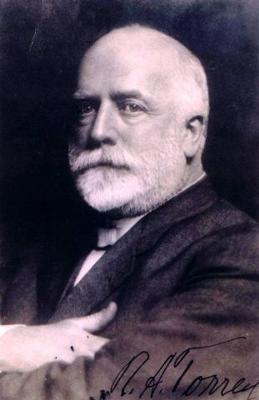The Holy Spirit - Chapter Six
III. Statements which in the Old Testament distinctly name the LORD or Jehovah as their subject are applied to the Holy-Spirit in the New Testament, i.e., the Holy Spirit is viewed as God in New Testament thought.
A striking illustration of this is found in Isaiah 6:8-10, “Also I heard the voice of the LORD, saying, Whom shall I send, and who will go for us? Then said I, Here am I; send me. And He said, Go, and tell this people, Hear ye indeed, but understand not; and see ye indeed, but perceive not. Make the heart of this people fat, and make their ears heavy, and shut their eyes; lest they see with their eyes, and hear with their ears, and understand with their heart, and convert and be healed.”
In verse five we are told that it was Jehovah whom Isaiah saw and who speaks. Whenever the word Lord is spelled in capitals in the Old Testament, LORD, it indicates that Jehovah was used in the Hebrew text.
Acts 28:25-27 refers to this statement from Isaiah in which Isaiah has Jehovah speaking. When Isaiah is quoted in Acts we are told that the Holy-Spirit was the speaker.
“And when they agreed not among themselves, they departed after that Paul had spoken one word, Well spake the Holy Ghost by Esaias the prophet unto our fathers, saying, Go unto this people, and say, Hearing ye shall hear, and shall not understand; and seeing ye shall see and not perceive: For the heart of this people is waxed gross, and their ears are dull of hearing, and their eyes have they closed; lest they should see with their eyes, and hear with their ears, and understand with their heart, and should be converted, and I should heal them.” Isaiah 6:6-8.
So we see that what is distinctly ascribed to Jehovah in the Old Testament is ascribed to the Holy Spirit in the New Testament. The Holy-Spirit is identified as Jehovah.
It is worth pointing out that in the Gospel of John 12:39-41, where another reference is made to this passage in Isaiah 6, this same passage is ascribed to Christ. Carefully note v. 41.
So in different parts of Scripture, we have the same passage referred to Jehovah, referred to the Holy Spirit and referred to Jesus Christ. This is strong evidence for the Trinitarian Godhead.
It is interesting to also notice the threefold “Holy” of the seraphims in Isaiah 6:3, “And one cried unto another, and said, Holy, holy, holy, is the Lord of hosts: the whole earth is full of His glory.”
We see then a clear suggestion of the tri-personality of Jehovah. A further suggestion of this tri-personality of Jehovah of Hosts is found in the eighth verse of the chapter where the LORD says, “Whom shall I send, and who will go for us?”
Another striking illustration of the application of passages in the New Testament to the Holy Spirit which in the Old Testament distinctly name Jehovah as their subject is found in Exodus 16:7.
“And in the morning, then ye shall see the glory of the LORD; for that He heareth your murmurings against the LORD: and what are we that ye murmur against us?”
Here the murmuring of the children of Israel is distinctly said to be against Jehovah. But in Hebrews 3:7-9, where this instance is referred to, we read, “Wherefore, as the Holy Ghost saith, To-day if ye will hear His voice, harden not your hearts, and in the provocation, in the day of temptation in the wilderness: When your fathers tempted Me, proved Me, and saw My works forty years.”
The murmurings which Moses in the Book of Exodus says were against Jehovah, we are told in the Epistle to the Hebrews were against the Holy Spirit. This leaves it beyond question that the Holy Spirit is viewed as Jehovah (or Deity) in the New Testament. Compare also Psalm 95:8-11.
IV. The name of the Holy-Spirit is coupled with God's name in a way it would be impossible for a reverent and thoughtful mind to couple the name of any finite being with God's Name.
We have an illustration of this in 1 Corinthians 12:4-6, “Now there are diversities of gifts, but the same Spirit. And there are differences of administrations, but the same Lord. And there are diversities of operations, but it is the same God which worketh all in all.”
Here we find God and the Lord and the Spirit associated together in a relation of equality that would be shocking if the Holy Spirit is not God. We have an even more striking illustration of this in Matthew 28:19, where Jesus identifies the Holy Spirit as God.
“Go ye therefore, and teach all nations, baptizing them in the name of the Father, and of the Son, and of the Holy Ghost.” Jesus Himself has no problem identifying the Holy Spirit as part of the Godhead, Father, Son and Holy Ghost.
Another striking illustration is found in 2 Corinthians 13:14, “The grace of the Lord Jesus Christ, and the love of God, and the communion of the Holy Ghost, be with you all. Amen.”
It would be wrong to link the Holy Spirit with God the Father in this way unless the Holy Spirit is Himself God.
V. The Holy-Spirit is called God.
The final and decisive proof of the Deity of the Holy Spirit is found in the fact that He is called God in the New Testament. We read in Acts 5:3, 4,
“But Peter said, Ananias, why hath Satan filled thine heart to lie to the Holy Ghost, and to keep back part of the price of the land? Whiles it remained, was it not thine own? And after it was sold, was it not in thine own power? Why hast thou conceived this thing in thine heart? Thou hast not lied unto men but unto God.”
In the first part of this passage we are told that Ananias lied to the Holy Spirit. Then we are told the lie was not unto men but unto God. When they lied to the Holy Spirit they lied to God.
Summary: By attributing all the distinctly Divine attributes and several distinctly Divine works to the Holy Spirit, by referring Old Testament statements clearly naming Jehovah the LORD to the Holy Spirit in the New Testament, by coupling the name of the Holy Spirit with the name of God, by plainly calling the Holy Spirit God, in all these unmistakable ways, God in His written word proclaims that the Holy-Spirit is a Divine Person.
to read another chapter.
the excellent biography
of R.A. Torrey by Roger Martin
or the Scofield Study Bible.
From the Holy-Spirit book,
Return to Gay Christian 101 Home Page.
First published by Fleming H. Revell Company in 1910, The Person and Work of the Holy Spirit, by R.A. Torrey, is in the public domain.



